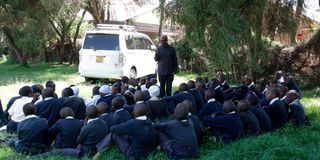Premium
Delayed funding, JSS mess crippling schools, say legislators

Mr Patrick Ng’ang’a, head teacher at DEB Comprehensive School in Elburgon, Nakuru County, speaks to Grade Nine pupils under a tree shade on January 06, 2025. Many schools in Molo Sub County have inadequate classrooms for grade nine learners.
Junior Secondary Schools (JSS) are grappling with an acute teacher shortage even as education institutions continue to face crisis due to delays in the disbursements of capitation two weeks after schools reopened for the first term.
At least 80,000 teachers currently teach in junior schools against the expected 140,000.
The Senate Education Committee chairperson Joe Nyutu says initial plans were to domicile JSS in secondary schools due to adequate infrastructure, including classrooms, laboratories and teachers.
However, a decision was made to have them in existing primary schools following proposals by the Presidential Working Party on Education Reforms. The pioneer cohort of the Competency-Based Curriculum (CBC) is currently in Grade 9.
In 2022, President William Ruto domiciled JSS in the existing primary schools following stakeholder engagement. He had formed the Presidential Working Party on Education Reforms to examine the CBC system.
The task force engaged experts, including professors, union officials and teachers' associations.
Whereas the Kenya Union of Post-Primary Education Teachers (Kuppet) urged the State to divide JSS between primary and secondary schools, President Ruto said more than 93 percent of Kenyans wanted the learners to remain in the primary schools.
“Initially JSS was supposed to be domiciled in secondary schools, but when the current regime came into power, President Ruto responded to the cries of parents. Parents were uncomfortable with letting their Grade 7 pupils join secondary school,” said Mr Nyutu.
However, the Murang’a senator said the decision to domicile JSS in primary schools has had implications.
“It has caused us very many problems. If you look at the current situation, we do not have enough teachers to handle JSS while this year we do not admit form ones, which would tell you there are teachers in secondary schools that are competent to teach but would not because JSS is domiciled in primary schools,” said Mr Nyutu.
Speaking during an interview on Citizen TV, he said political interference has affected the CBC.
Mr Nyutu also said delays in the disbursement of capitation to schools were affecting learning.
“Capitation is not only delayed to be disbursed to amounts, especially in secondary schools, which were reduced from around Sh22, 000 to Sh17, 000 due to inflation. This, however, brings a lot of concerns. It’s not all gloom, but we have challenges,” said Mr Nyutu.
He urged education officials to allow professionals to formulate policies in the sector instead of allowing political interference.
Kibra MP Peter Orero, who is a member of the National Assembly Education committee, said the government should allow the sector to be run by professionals.
He pointed out that the previous administration of President Uhuru Kenyatta had recommended that JSS be based in secondary schools.
“By then I was a principal, and we had put up classrooms for these students to join secondary schools. But when President Ruto was elected, he formed the PWPER which came up with new policies that affected funding, including in our universities,” said Mr Orero.
Mr Orero, an educationist with over 30 years’ experience, said capitation is the biggest challenge affecting learning in secondary schools.
He said during President Mwai Kibaki’s administration, when Free Day Secondary School was introduced, the government allocated Sh22,000 per student, which allowed the institutions to run smoothly.
“But as we moved on the capitation was reduced to Sh17,000 per student annually. But not all of it is disbursed to schools on time. If we are serious about education, we should make all the day primary and secondary schools free. We must alleviate the lack of funds in our schools,” said Mr Orero.
He said most schools cannot run due to huge debts from suppliers. Mr Orero called budgeting for pending bills for schools.
The Kibra MP said secondary schools have pending bills.
“We need to be intentional and purposeful in our approaches towards solving critical problems facing schools in this country,” said Mr Orero.
He said the National Assembly Education committee proposed Sh2 billion for promotions but it was slashed to Sh1 billion by its Budget counterpart.
“Today we have more than 180,000 teachers scrambling for 25, 000 promotion posts, this is because, for the last 17 years, there has been a stagnation in promotion in this country. There were no funds allocated for teachers. Can you imagine somebody not being promoted for 17 years,” he asked.
Mr Nyutu questioned why there is money for the renovation of the Deputy President’s house while there are delays in capitation.
“Why are there delays in the disbursement of capitation? Why is there a reduction in capitation while we have enough money to renovate the DP’s residence in Karen? Why are some ministers attending functions aboard choppers?” he asked.
Mr Orero said lack of disbursements has forced principals to borrow or charge extra fees to sustain learning institutions.
“Some principals are in a great dilemma. You are given over 3,000 students to manage without funding. What do you think they would do? Of course, ask parents to fill the void. The government must take responsibility,” said the former principal.
He said lack of funding in the secondary schools can cause strikes.
“If there is no food, the students do not understand. They do not know what capitation is all about so they will riot, some even burn schools.”
Last week, Treasury Cabinet Secretary John Mbadi assured school administrators that the capitation funds will be in the school accounts this week to alleviate operational difficulties.





